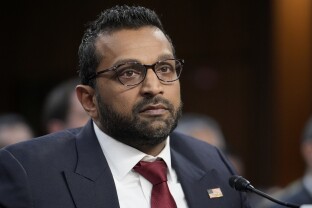President Donald Trump’s pick for FBI director, Kash Patel, faced a reckoning during his confirmation hearing on Thursday, with Democratic senators asking him to answer uncomfortable questions about his MAGA-inspired conspiracy theories, his supposed political enemies list and his vow that “we’re going to come after people in the media.”
From the start, Patel assured Senate Judiciary Committee members that he would only initiate investigations that had a “predicate” indicating an actual crime, and he promised to open the FBI to “aggressive constitutional oversight from Congress” like never before.
And despite widespread concerns that Patel would seek to punish FBI special agents who assisted since-departed special counsel Jack Smith to investigate Trump, Patel pledged to take care of all FBI personnel.
“They are warriors of justice, and I will always have their backs,” he said.
Still, senators probed Patel’s ties to questionable fringe movements. Even Judiciary Chairman Chuck Grassley, who already expressed his support for Patel, had him explain his past dismissive statements about the Jan. 6 attack on the Capitol, as well as asking Patel whether he is a “follower or promoter of QAnon” — the cult movement that believes a cabal of satanic cannibals who molest kids run a “deep state” against Trump.
“No, I am not. I have rejected QAnon baseless conspiracy theories,” Patel said under oath.
Democratic senators remained unconvinced.
“This is somebody who’s left behind a trail of grievances,” ranking Democrat Dick Durbin said. “He trafficks in debunked conspiracy theories that serve or benefit his political beliefs.”
Durbin repeatedly pointed to Patel hawking “vaccine detox” dietary supplements, implausible theories that he floated in his 2023 book titled “Government Gangsters” and Patel’s claim that the FBI was “planning Jan. 6 for a year” on his “Kash’s Corner” online show hosted by The Epoch Times, a far-right media company tied to the Chinese religious movement, Falun Gong.
Durbin grilled Patel about his many media appearances and run-ins with right-wing media personalities. At one point, Patel claimed under oath that he could not “off the top of my head” remember associating with Stew Peters — although Durbin pointed out that Patel has appeared on the alt-right podcaster’s show eight times.
“My association, as you loosely defined it, is by appearing in media over a thousand times to take on people who are putting on conspiratorial theories … to talk to them about the truth,” he said.
Faced with such serious questions, Trump allies on the Judiciary Committee tried to make light of the Democratic attacks.
Sen. Thom Tillis, who introduced Patel, boasted about putting together a bingo card with terms that would be likely to come up during the daylong hearing — including “enemies list” and “deep state.”
“Some may view this as an unserious caricature,” Tillis said, but he justified the stunt by arguing that “some people will be here to simply substantiate a false narrative.”
When it was Sen. Lindsey Graham’s turn, he joked, “We’ll eventually talk about the FBI.”
Graham went on to extract assurances from Patel that the FBI would never repeat the kinds of internal processes that led to the creation of the operation Crossfire Hurricane, which investigated Trump’s ties to Russia during his first presidential term.
But Democrats resisted Republican attempts to normalize Patel, who has previously said he would shut down the main FBI building on “Day One.”
“We are entering a strange and dangerous time,” Sen. Sheldon Whitehouse said, noting worries by many — including conservatives and Patel’s own former colleagues — that Patel would become “Trump’s enforcer,” “punish political rivals” and “hand out get-out-of-jail-free cards” to MAGA supporters.
Whitehouse noted the massive gap between Patel’s documented past and what he called the “facade” underway during the hearing, in which Republicans brushed aside concerns about Patel’s fiercely political past statements.
When questioned by Sen. Amy Klobuchar, Patel faced nearly a dozen of his past statements, ranging from calling American journalists the country’s “most powerful enemy” to floating the idea of prosecuting unknown individuals “for an actual RICO statute violation, for criminally organizing the United States government to break the law to rig presidential elections.”
But Patel leaned on a defensive tactic that had him refusing to answer any of the questions, dismissing each one as a “partial statement” that he couldn’t speak about because “I don’t have that in front of me.”
But questions from Sens. Chris Coons and Mazie Hirono later elicited two major clarifications from Patel — one that could deepen worries that he could retaliate against his perceived “enemies list” and another that may relieve concerns that he could turn the FBI against American journalists.
Patel was repeatedly asked whether he would engage in potential investigations against FBI agents who worked on the Smith case against Trump, former FBI Director Chris Wray and the dozens of ex-government officials Patel has labeled members of the “deep state.”
“I have no interest, no desire, and will not go backwards. There will be no politicization at the FBI,” he said, promising not to engage in “retributive” actions.
However, he later added that “no one that did not break the law will be investigated,” once again opening the door to potential law enforcement actions.
Then, when asked about his vow to “come after people in the media,” Patel’s answers suggested any legal revenge would come in the form of private defamation lawsuits — not FBI criminal probes.
“Not unless private citizens have been defamed, that’s their right,” he said. “I can’t go after the media for other people. That’s a decision they have to make.”
—
Jose Pagliery is a reporter at NOTUS.
Sign in
Log into your free account with your email. Don’t have one?
Check your email for a one-time code.
We sent a 4-digit code to . Enter the pin to confirm your account.
New code will be available in 1:00
Let’s try this again.
We encountered an error with the passcode sent to . Please reenter your email.


